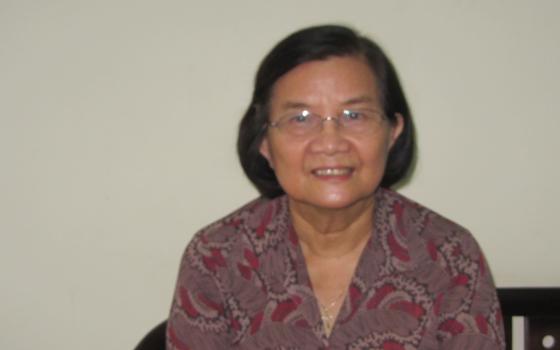Notre Dame Sr. Thecla Tran Thi Giong, who earned a doctoral degree in counseling and psychotherapy from the Philippines in 1993, has taught at universities and in inter-congregational theological formation programs for men and women religious for more than 20 years in Vietnam.
Giong is among the first Catholic nuns who were allowed to study abroad in the late 1980s after the country was reunified under communist rule in 1975 when the war ended.
The psychologist counsels university students and young nuns and gives spiritual guidelines to men and women religious. She also conducts training courses on specific topics requested by different congregations and parishes.
Giong recently spoke with GSR about her work and the role of women religious in the church and society:
How do your professional expertise and vocation support one another?
First of all, I myself get insights from my psychological studies that help me understand myself a little more and give me strength to overcome my own challenges in religious life.
Consecrated life is to serve other people, so I use counseling psychology to meet the psychological and spiritual needs essential to people’s lives.
In addition, as a nun, I spend much time listening to and being with my clients under any circumstances. I am ready and willing to help people with their problems.
Sisterhood also works to my advantage. That is, those who face matters of individual conscience and morality feel more at ease telling me about it than they do with other counselors. People seem to trust consecrated people implicitly.
What have you done for the local church?
My contribution may only be a drop of water in the ocean, but I count myself lucky to have taught inter-congregational theological formation programs for men and women religious for years. I find them to be full of energy and enthusiasm.
Moreover, it seems that the circle of nuns are earning the trust of church people when I am invited to lecture in permanent formation courses held by different religious congregations or conduct less formal training courses and retreats and present specific topics to Catholic parents and youths at parishes.
I thank God that the local Catholic church is opening doors to nuns to take part in various areas of the church life. Recently one nun was invited to teach at a major seminary. In previous years, I was only asked to talk about specific topics to seminarians. That’s it.
How has the role of women religious in the church changed?
Honestly, there is little. Most nuns do pastoral work at parishes. Their work includes teaching catechism classes, leading choirs, giving liturgical services and working with elderly people and patients. They also look after children at daycare centers and provide basic education to children from poor families.
Others take part in social work and health care services. Only a few nuns teach at public schools and universities.
Nuns today have higher education compared with those in the past. They complete courses at colleges or universities, so they have more confidence in their pastoral and social activities. And it seems that nuns are treated with more respect by their colleagues and priests than in the past.
What challenges do young women religious face?
In my view, most of them are from rural areas and seem to have a little inferiority complex about their humble origins, education and rural way of life compared with others in urban areas.
The generation of nuns under age 50 have grown up in the revolutionary time [under communist rule] and have experienced poverty and hardship. Parents did not have enough time to look after children, and schools gave less humane education to students.
They need a more humane formation so that they can live out their commitment to consecrated life happily and abundantly.
It seems that the main activities of nuns are still limited to daycares and parishes. They have very few opportunities to work in other areas.
Probably due to the national tradition and culture, Vietnamese women, including nuns, often tend to tolerate annoying things and be too timid to speak up. They consequently seem to lack self-confidence. Meanwhile, men give themselves more power than women and are not educated to protect weaker people.
So I believe nuns will make significant contributions to the church and society, and the effectiveness of their ministries will improve if they are given the chances to cooperate and hold open dialogs with other people, especially clergy, on the basis of mutual respect.
How do you help women religious?
I counsel them to build inner strength and self-confidence, acknowledge their own value and reveal it to other people. Once women religious respect their own values, others will respect them, too. Finally, nuns have to make their voice heard when they are treated unfairly as a way to protect themselves.
[Joachim Pham is a correspondent for Global Sisters Report, based in Vietnam.]

